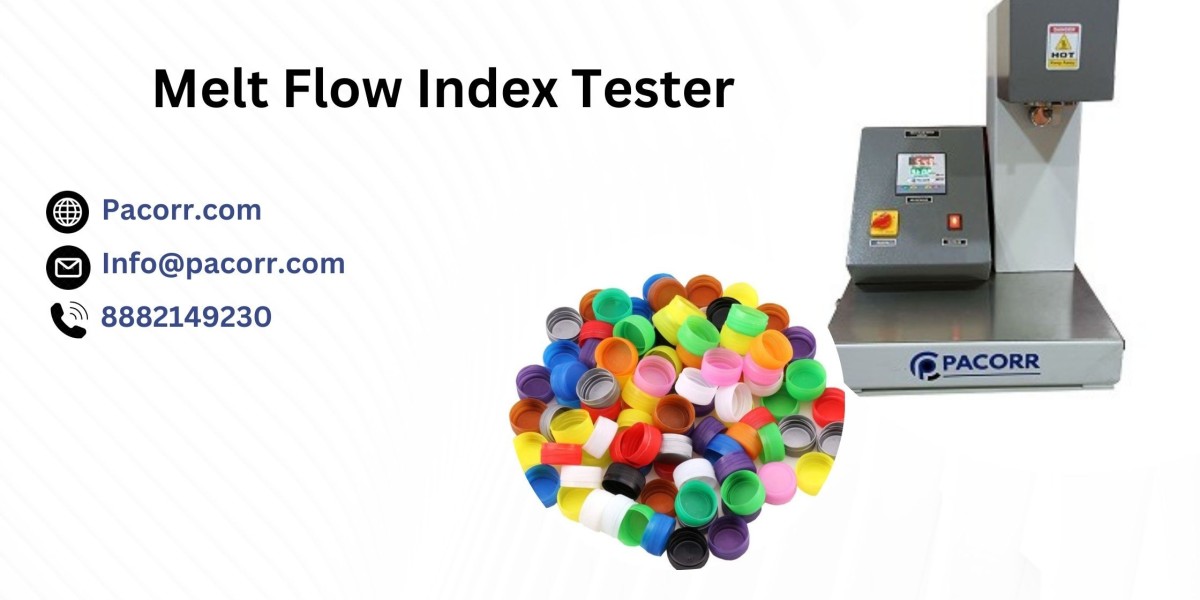What is a Melt Flow Index Tester?
A Melt Flow Index (MFI) Tester, also known as a Melt Flow Rate (MFR) Tester, is an instrument used to measure the rate at which a thermoplastic polymer extrudes through a die under specified conditions of temperature and pressure. This rate, expressed in grams per 10 minutes, is known as the Melt Flow Index Testing. The MFI provides insights into the materials viscosity and flow characteristics, which are crucial for processing and quality control.
Why is Melt Flow Index Testing Important?
1. Quality Control
MFI testing is integral to maintaining consistent quality in plastic products. It helps identify batch-to-batch variations in raw materials, ensuring that only materials meeting the required specifications are used in production.
2. Material Selection
Manufacturers can select the appropriate material for specific applications based on the flow properties determined by the MFI Tester. This ensures that the final product possesses the desired mechanical properties and performance characteristics.
3. Process Optimization
Understanding the melt flow characteristics assists in optimizing the injection molding and extrusion processes. It helps in reducing waste, improving efficiency, and minimizing defects in the final product.
4. Compliance with Standards
Ensuring that materials meet industry standards and specifications is critical for regulatory compliance. MFI testing helps manufacturers adhere to these standards, ensuring product reliability and safety.
How Does the Melt Flow Index Tester Work?
The Melt Flow Teste operates by heating a sample of the polymer to a specified temperature. A weight is then applied to the molten polymer, forcing it through a capillary die. The rate at which the polymer extrudes through the die is measured, and this rate, expressed as grams per 10 minutes, is the Melt Flow Index.
Key Components of the MFI Tester
Heater Unit: Maintains the polymer at the test temperature.
Piston and Weight System: Applies a consistent force to the molten polymer.
Capillary Die: Through which the polymer extrudes.
Timer and Balance: Measures the rate of extrusion.
Applications of Melt Flow Index Testing
1. Plastic Manufacturing
MFI testing is widely used in the production of plastic films, pipes, and containers to ensure product consistency and quality.
2. Automotive Industry
The automotive industry utilizes Melt Flow Index Tester Price to select materials with suitable flow properties for various components, ensuring durability and performance.
3. Packaging
MFI testing ensures that materials used in packaging have the right balance of strength and flexibility, meeting the stringent requirements of the packaging industry.
4. Consumer Goods
From toys to household items, MFI testing ensures that plastic products meet quality standards and are safe for consumer use.
Advantages of Using Pacorrs Melt Flow Index Tester
1. Precision and Accuracy
Pacorr's MFI Testers are designed to provide precise and accurate measurements, ensuring reliable data for quality control.
2. User-Friendly Interface
The MFI Testers feature easy-to-use controls and interfaces, making the testing process straightforward and efficient.
3. Durability and Reliability
Built with high-quality materials, Pacorr's MFI Testers are durable and reliable, ensuring long-term performance.
4. Compliance with Standards
Our MFI Testers comply with international standards such as ASTM D1238 and ISO 1133, ensuring global applicability.
Frequently Asked Questions (FAQ)
Q1: What materials can be tested with the Melt Flow Index Tester?
A1: The Melt Flow Index Testing is suitable for a wide range of thermoplastic polymers, including polyethylene (PE), polypropylene (PP), polystyrene (PS), and more.
Q2: How often should the MFI Tester be calibrated?
A2: Regular calibration is essential for accurate results. It is recommended to calibrate the tester at least once a year or as per the manufacturer's guidelines.
Q3: Can the Melt Flow Index Tester measure the flow properties of recycled plastics?
A3: Yes, the MFI Tester can measure the flow properties of both virgin and recycled plastics, making it a valuable tool for sustainability initiatives.
Q4: What is the significance of the test temperature in MFI testing?
A4: The test temperature is crucial as it simulates the processing conditions of the polymer. Different polymers have specific test temperatures to ensure accurate results.
Q5: How does the MFI Tester help in material selection?
A5: By providing precise measurements of a polymers flow properties, the MFI Tester aids manufacturers in selecting materials that meet the specific requirements of their applications.
Conclusion
The Melt Flow Teste is an indispensable tool for anyone involved in the plastic manufacturing industry. By providing precise and reliable measurements of polymer flow properties, it ensures quality, efficiency, and compliance in production processes. Explore the range of MFI Testers on Pacorr.com to enhance your manufacturing capabilities and maintain the highest standards of quality.
For more information and to find the right Melt Flow Index Tester for your needs, visit Pacorr.com Melt Flow Index Tester page.








